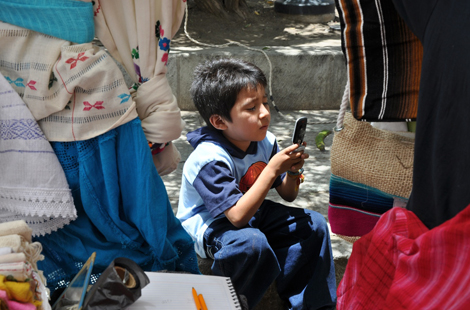Maurer receives National Science Foundation grant to study emerging mobile money transfer industry
Maurer receives National Science Foundation grant to study emerging mobile money transfer industry
- February 17, 2010
- Anthropology professor and IMTFI director Bill Maurer receives grant to study emerging mobile money transfer industry
 Cell phones have come a long way from their beginnings as luxury items that allowed
users to communicate more freely beyond the confines of land lines. As of early February,
Apple’s popular iPhone boasted 152,200 active applications available for download
that let users do everything from remotely setting their home DVR to finding the perfect
pitch on a musical instrument.
Cell phones have come a long way from their beginnings as luxury items that allowed
users to communicate more freely beyond the confines of land lines. As of early February,
Apple’s popular iPhone boasted 152,200 active applications available for download
that let users do everything from remotely setting their home DVR to finding the perfect
pitch on a musical instrument.
For more than six million people in Kenya and many others around the developing world, cell phones are being utilized for yet another new purpose: serving as virtual wallets and piggy banks. The process, says Bill Maurer, UCI anthropologist has those in the banking and mobile industries squirming.
“When telecommunications companies get into the business of money transfer or even banking, there may be new risks to consumers, banks and the financial system itself,” he says.
Maurer, who directs UCI’s Institute for Money, Technology and Financial Inclusion, a Gates Foundation-funded institution focused on how the world’s poor spend and save money, has received a $218,000 grant from the National Science Foundation to explore regulatory challenges emerging in the new mobile banking industry. His findings will be used in the development of future policies and laws created to help govern the largely unregulated industry.
Of particular interest in the study is Kenya’s M-PESA mobile money transfer system. The transaction system allows people in remote areas to send and receive money via cell phone text messages without involving banks – an issue which, so far, has worked in favor of poor and middle-class Kenyans who don’t have bank accounts, either due to lack of access to a nearby bank or insufficient funds to maintain an account.
However, the absence of a banking authority has many concerned.
“Questions arise as to who holds the deposits when they’re made and what gets done with them while they’re sitting in peoples’ accounts,” says Maurer. “Should interest payments be made? What about deposit insurance?”
User authentication is another area of concern with emerging mobile money services in the developing world because many people share their mobile phones.
“What happens if you lose your phone containing your text messaged-funds – do your savings go along with it?” Maurer asks.
Working with telecommunications companies, banks, regulatory agencies and end users of the service, Maurer will study how policies may be created to address these issues.
While Kenya’s funds transfer system will be one of the key processes to be studied, similar issues exist for the emerging mobile money transfer systems gaining traction in India, Mexico and South Africa.
Due to the borderless nature of mobile communications, says Maurer, the U.S. Federal Reserve is highly interested in the development of regulations for this emerging industry. Later this month, the Fed will be hosting a conference on the topic at which Maurer will be an invited participant.
Funding for this study will begin in June and run through May 2013.
-photo courtesy of Melissa Cliver Design Research
Share on:
Related News Items
- Jewish American Heritage Month
- Reflecting on the assets and needs of Orange County's Asian American & Native Hawaiian and Pacific Islander communities
- A story worth telling
- California's prison death rates rose amid COVID
- COVID prison death rate increased 3 times higher than broader population: study




connect with us